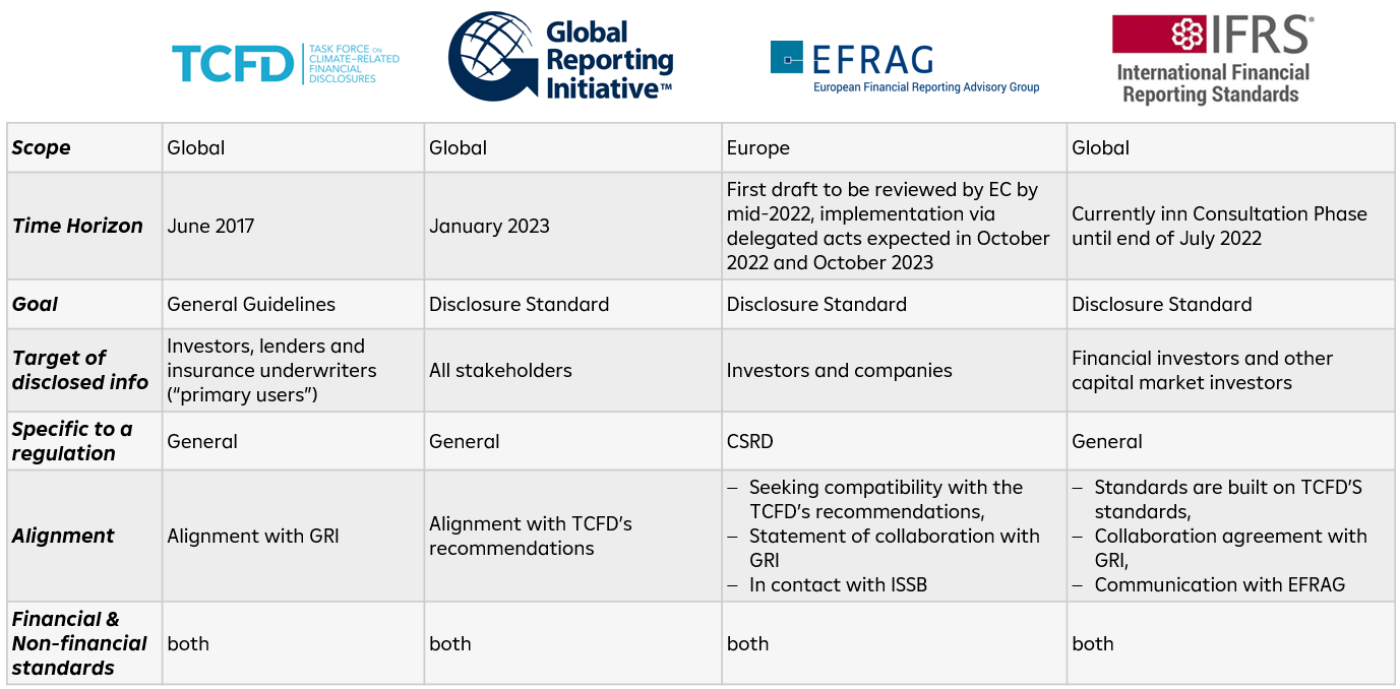
The landscape of Sustainability Reporting Standards
The landscape of Sustainability Reporting Standards within the EU, as well as internationally, is a broad and a complicated one. EU law requires certain large institutional or financial entities to disclose information on how they operate and manage social and environmental challenges (CSRD & NFRD).
Here are four of the most important Standards:
1. EFRAG (European Financial Reporting Advisory Group):
The EFRAG Project Task Force on European Sustainability Reporting Standards (PTF – ESRS) publishes cluster working papers, its goal is to establish transparency. EFRAG will develop draft standards using due process, transparency and public oversight, as well as the expertise of relevant stakeholders, in accordance with the European Commission’s proposal for a Corporate Sustainability Reporting Directive (CSRD), currently being reviewed by EU co-legislators. Standards are part of a three-step review process, so they should be viewed as a work in progress. First Draft Exposure will be reviewed by the European Commission in mid-2022, which will then finalize an initial set of ESRSs by October 2022 and further sector-specific standards by October 2023 and 2025.
Non-financial Reporting:
Having been asked by the European Commission to begin technical work on the PTF-NFRS recommendations, EFRAG is making significant progress in developing draft European sustainability reporting standards, while also reforming its governance model.
Originally known as the Project Task Force on NFRS, it has been renamed the Project Task Force on European Sustainability Reporting Standards (PTF-ESRS). As soon as the EFRAG sustainability reporting bodies are established following the planned governance reforms, the PTF-ESRS is invited to begin developing standards in project mode.
2. IFRS (International Financial Reporting Standards) – international:
In addition to developing and approving IFRS Sustainability Disclosure Standards (IFRS SDS), the ISSB is responsible for all technical matters related to sustainability for the IFRS Foundation. Two prototypes of general sustainability and climate disclosures are currently available; these will serve as the basis for the ISSB's proposed standards, which are expected to be published by mid-2022. A summary of industry disclosure requirements is provided, organized by sector and industry. Each industry’s disclosure topic(s) is accompanied by a set of accounting metrics.
3. TCFD (Task Force on Climate-Related Financial Disclosures) – international:
The TCFD is a guiding framework that establishes common principles for how companies and other organizations should provide information on the risks and opportunities associated with climate change. It is not about how to disclose, but rather what to disclose. The recommendations have been mapped against already existing disclosure frameworks and act as a guide for a more effective reporting process. They were published in June 2017.
Principles for effective disclosure:
As well as recommending on what and how information should be disclosed, the TCFD recommends seven principles for effective and high-quality disclosure:
- Disclosure should represent relevant information
- Disclosure should be specific and complete
- Disclosure should be clear, balanced, and understandable
- Disclosure should be consistent over time
- Disclosure should be comparable among companies within a sector industry or portfolio
- Disclosure should be reliable, verifiable, and objective
- Disclosure should be provided on a timely basis
4. GRI (Global Reporting Initiative) – international:
The GRI is an independent standards organization that helps businesses, governments and other organizations understand and communicate their impact on issues such as climate change, human rights and corruption. The GRI Standards are a mix of requirements and recommendations, they are the most widely used sustainability reporting standards worldwide. They are effective for reports or other materials published on or after January 1st 2023. The GRI Sector Standards intend to increase the quality, completeness, and consistency of reporting by organizations. Standards are developed for 40 sectors. The Standards list topics that are relevant to most organizations in different sectors and indicate relevant disclosures to report on these topics. If an applicable Sector Standard is available, an organization is obliged (‘required’) to use it when reporting with the GRI Standards.

For inquiries please contact:
regulatory-advisory@rbinternational.com
RBI Regulatory Advisory
Raiffeisen Bank International AG | Member of RBI Group | Am Stadtpark 9, 1030 Vienna, Austria | Tel: +43 1 71707 - 5923